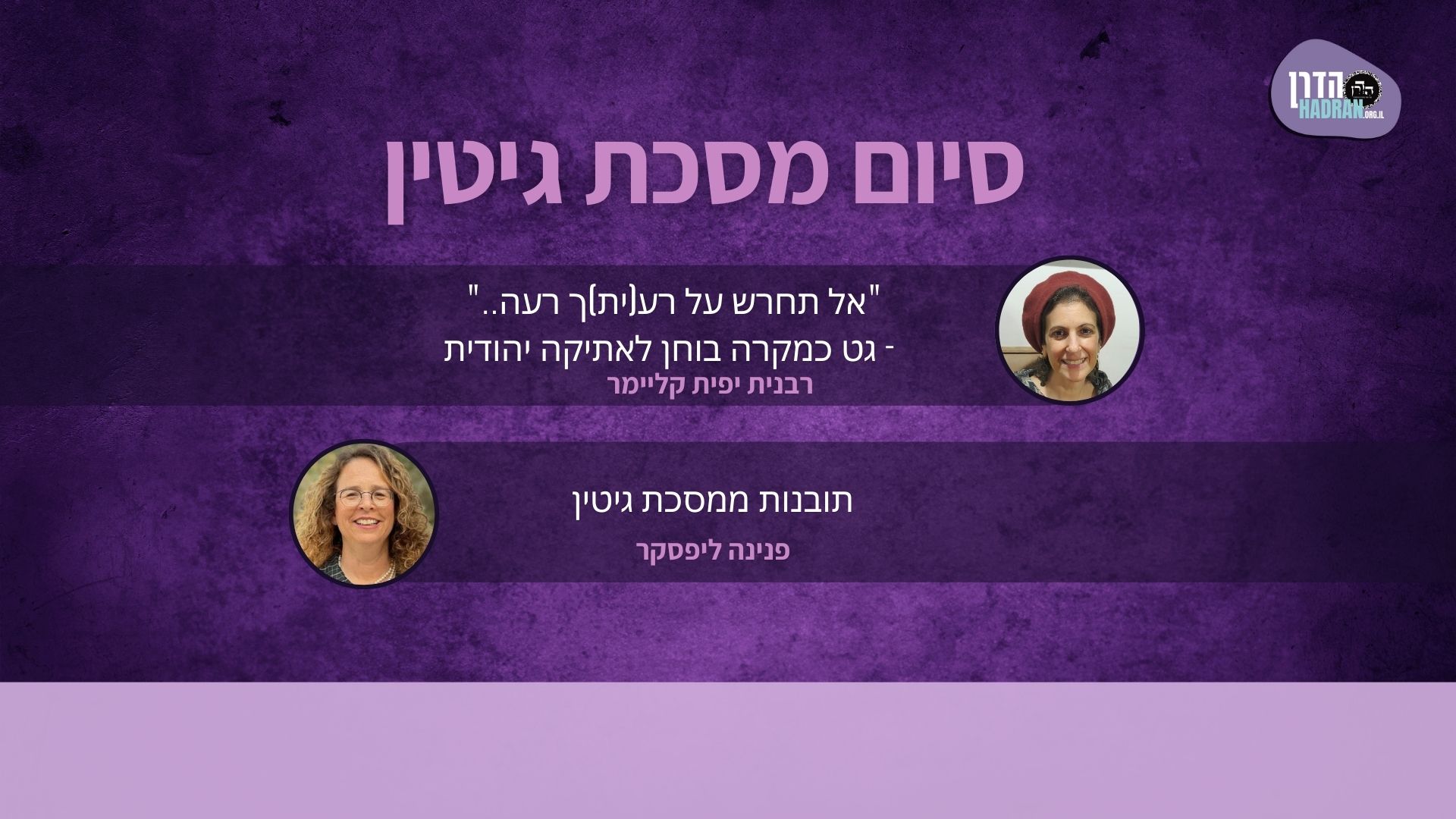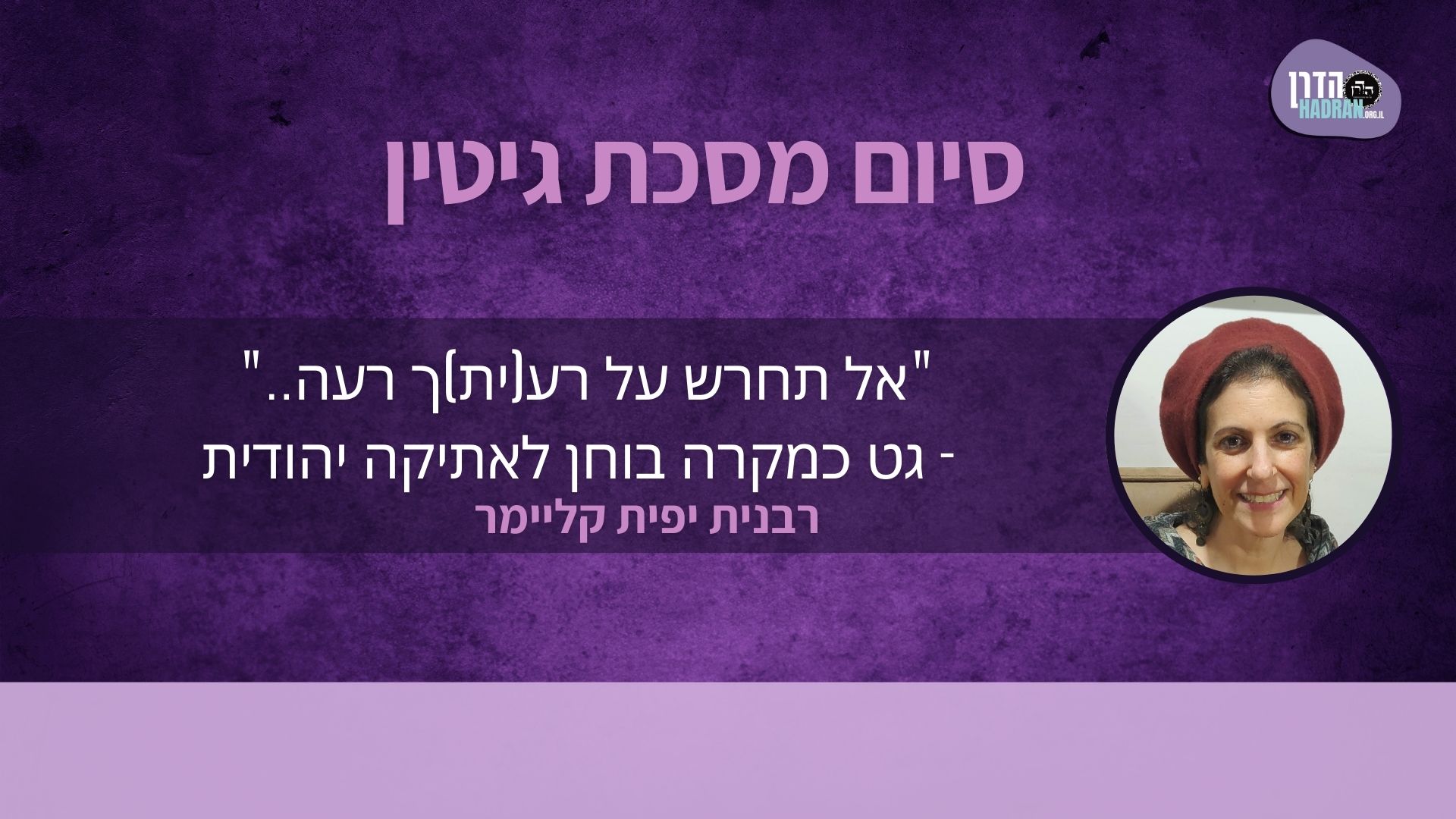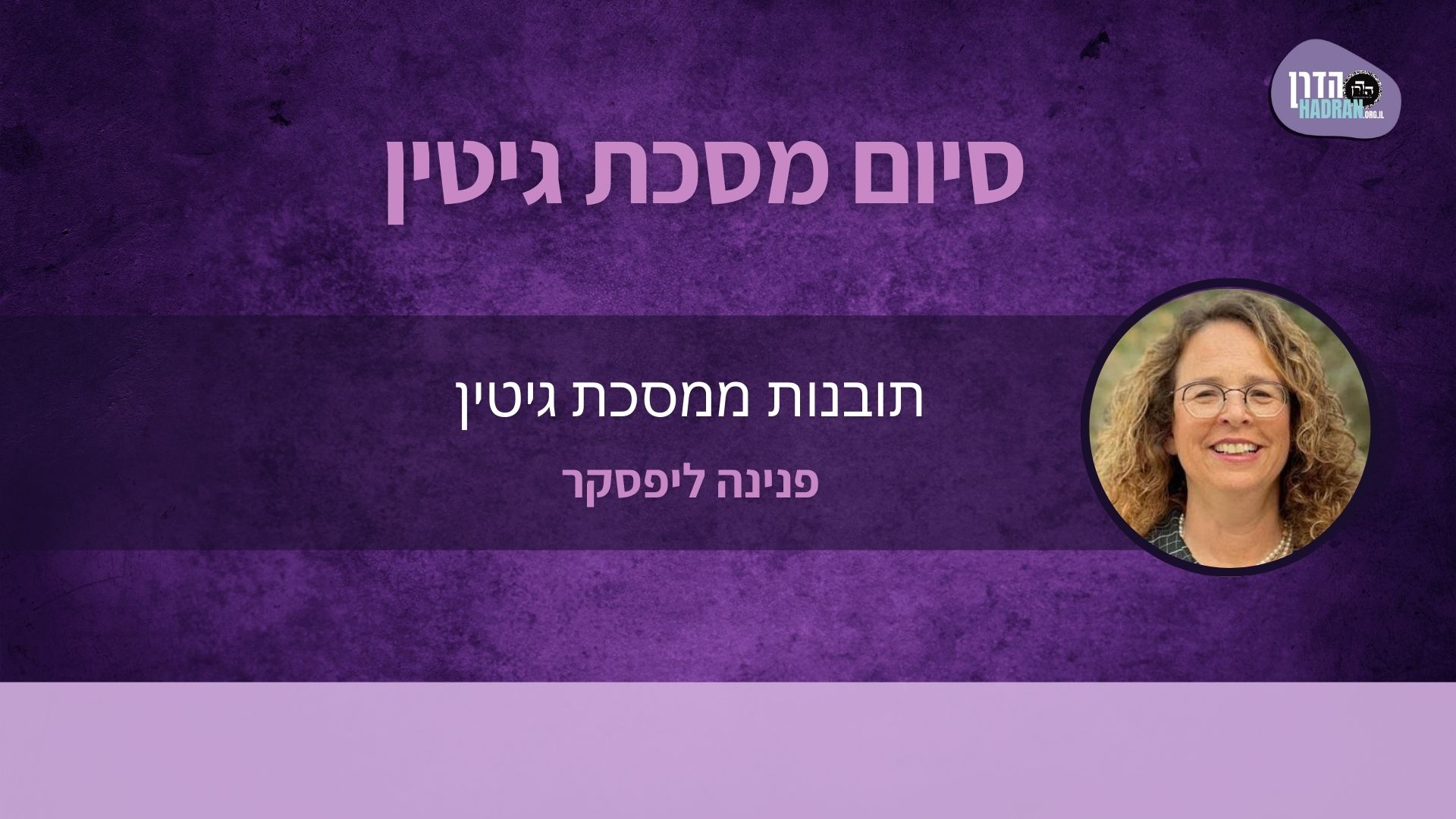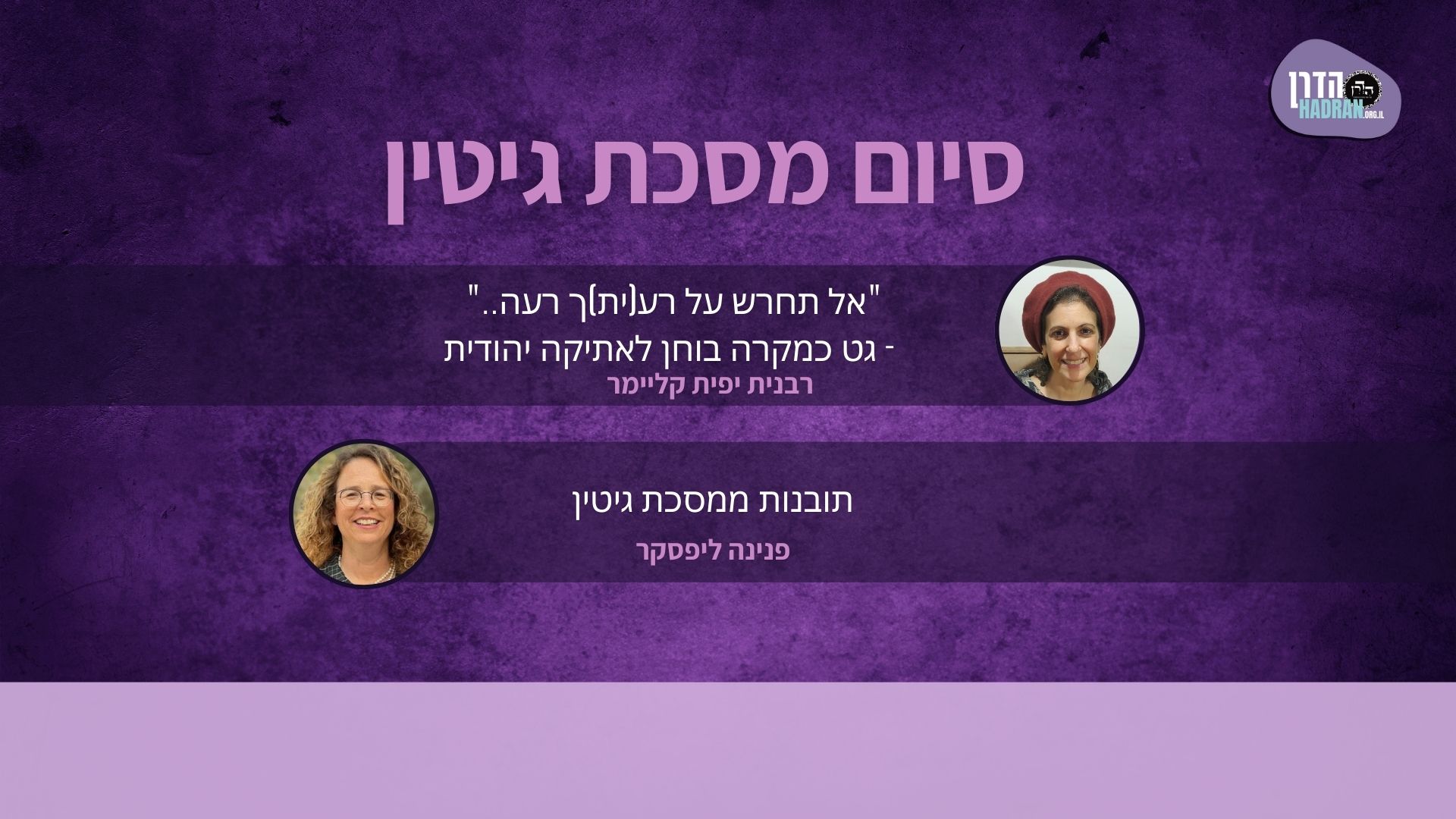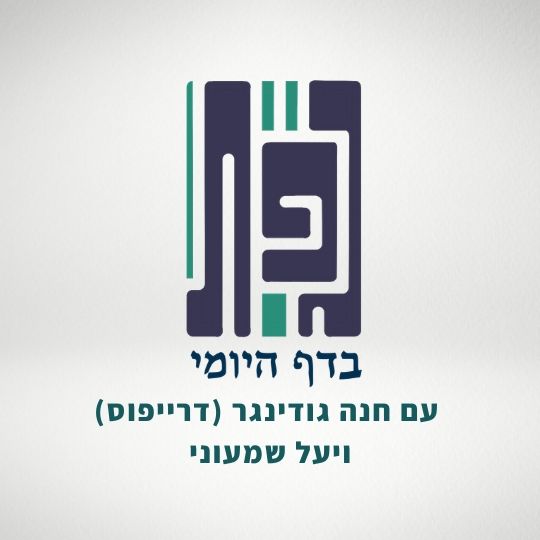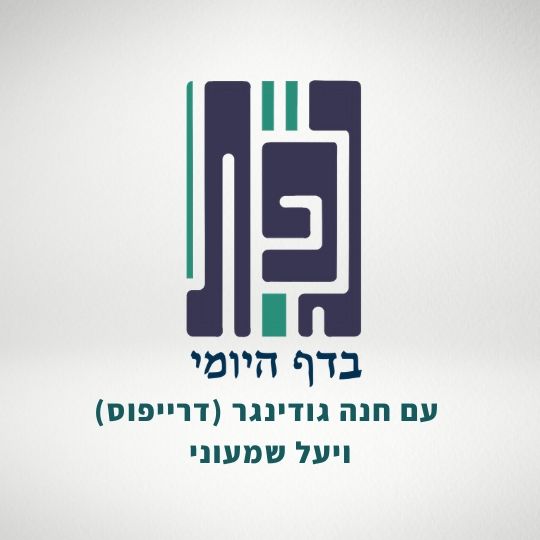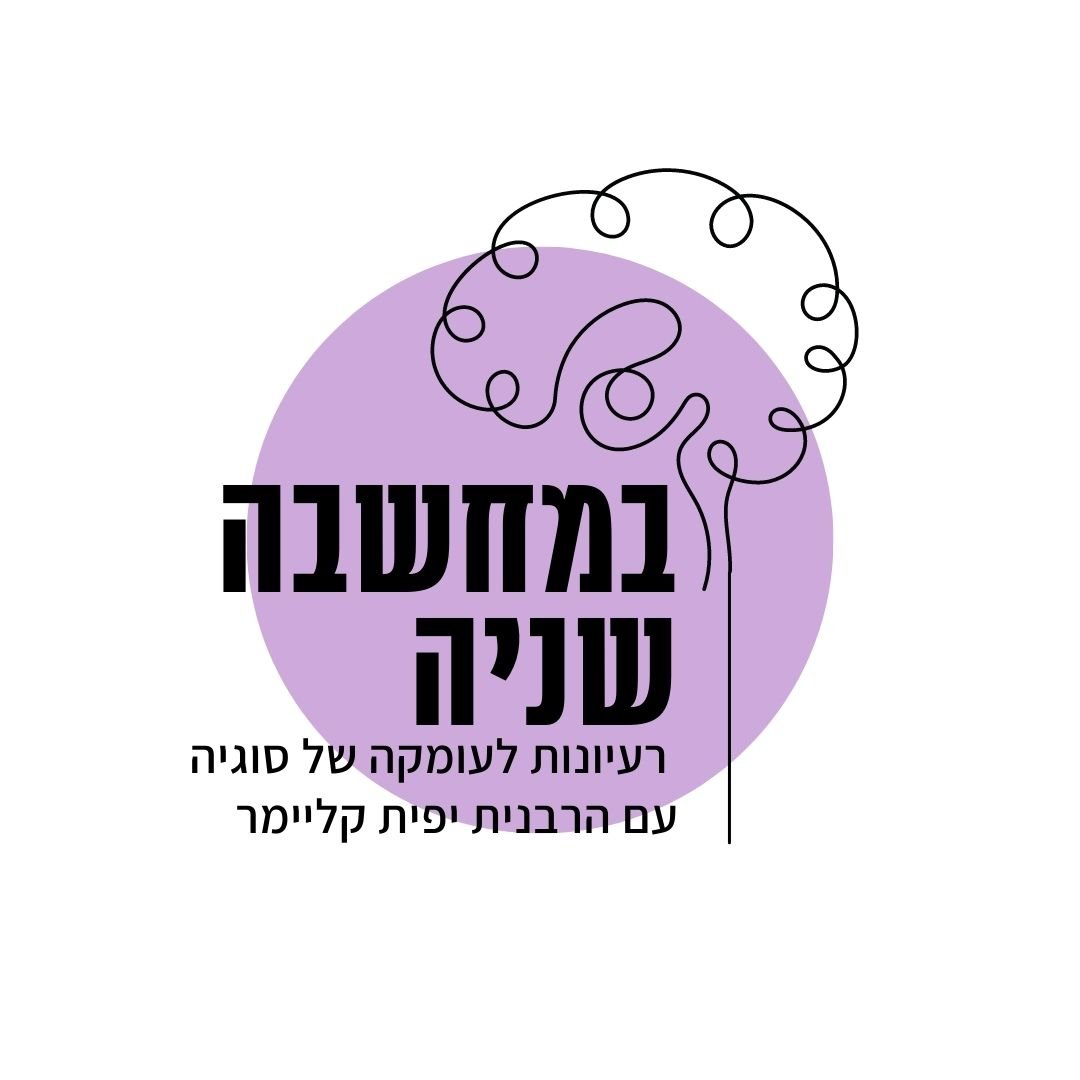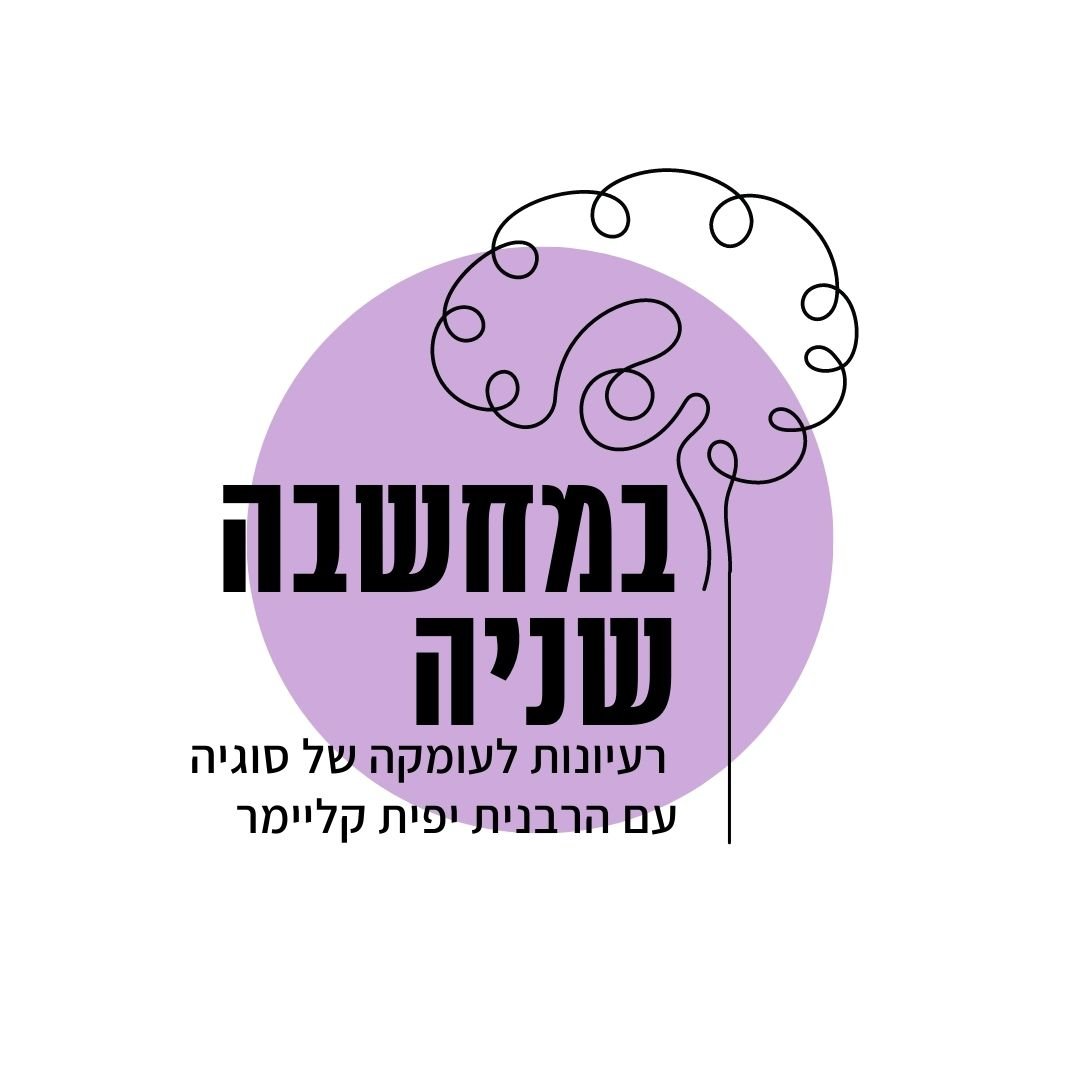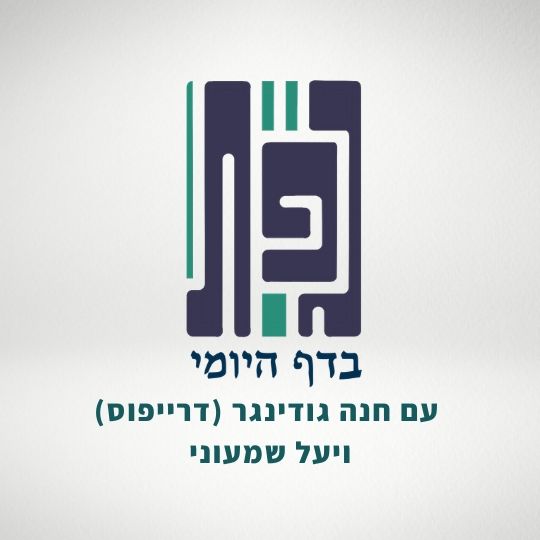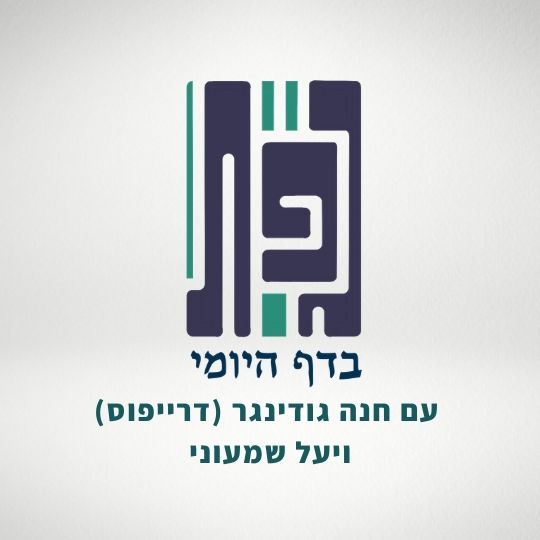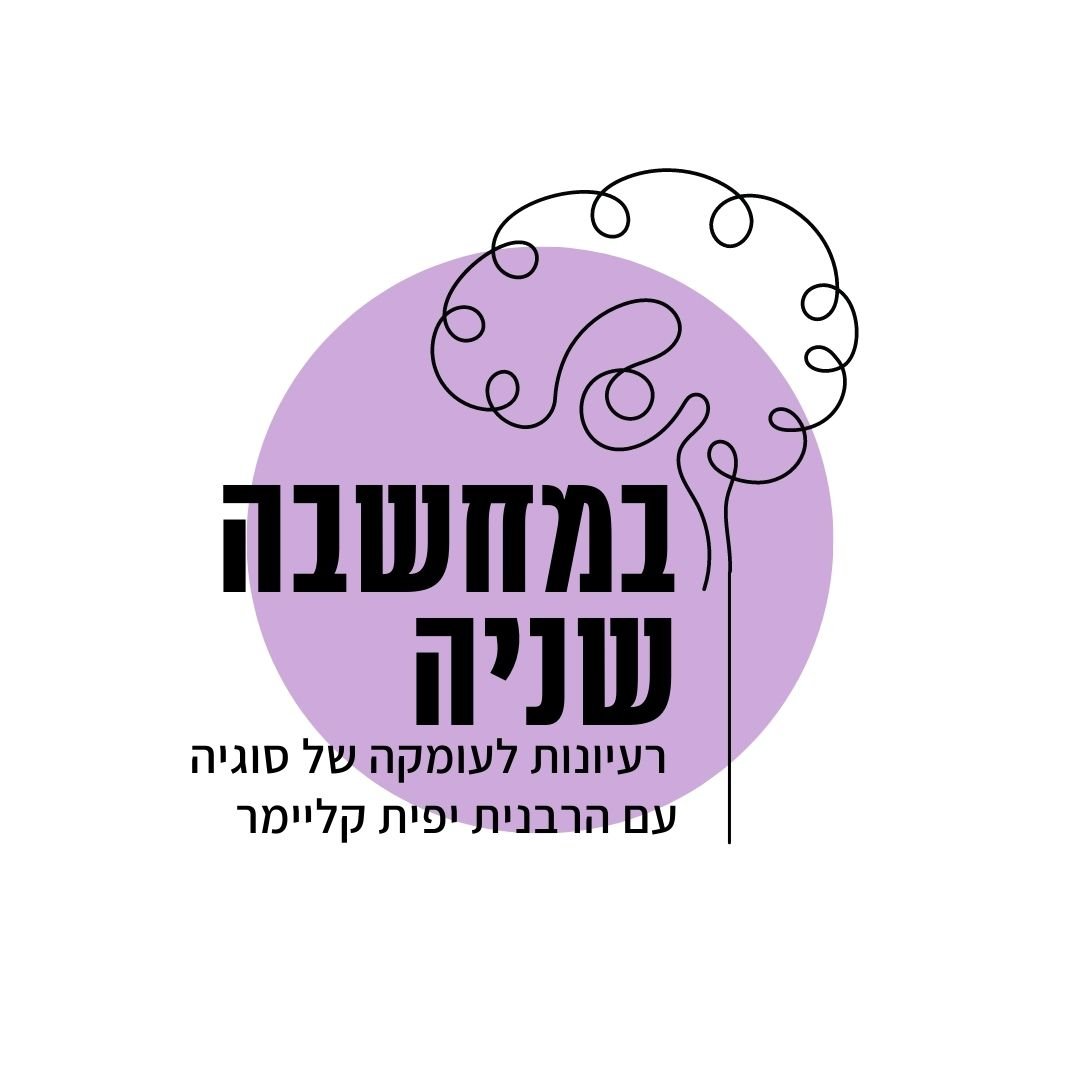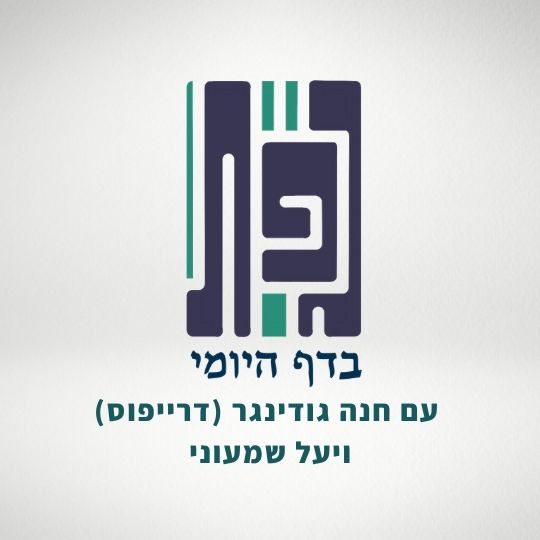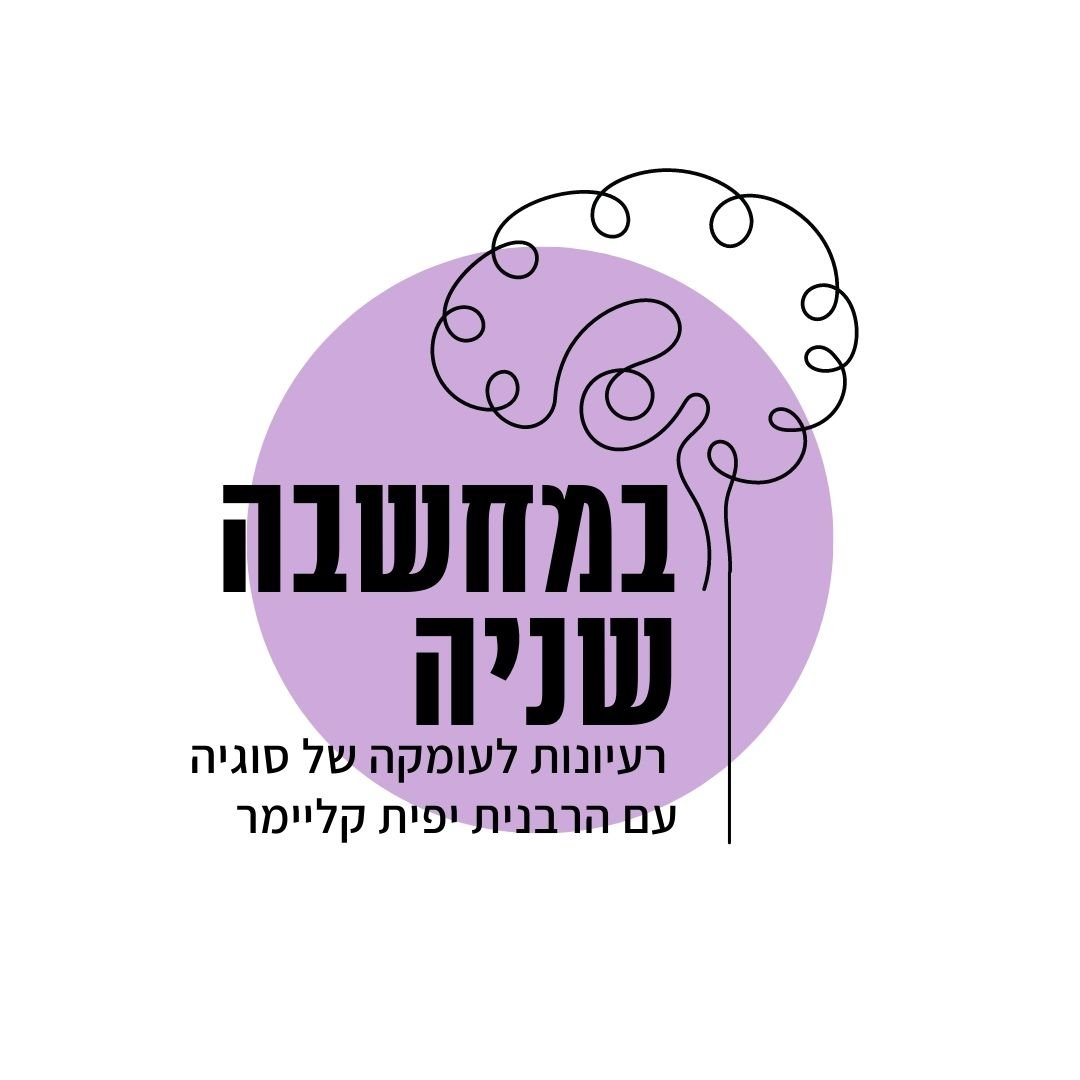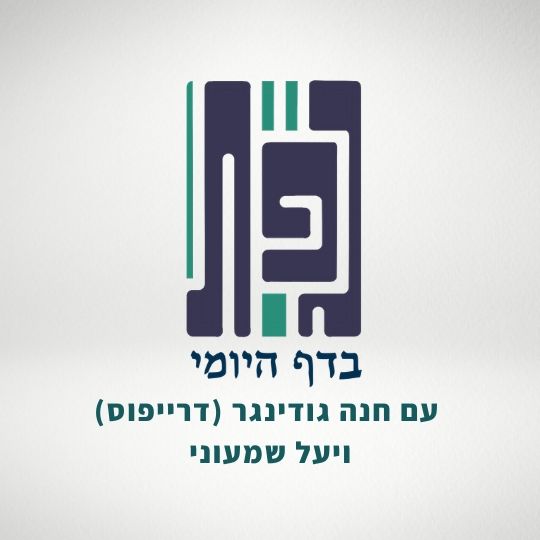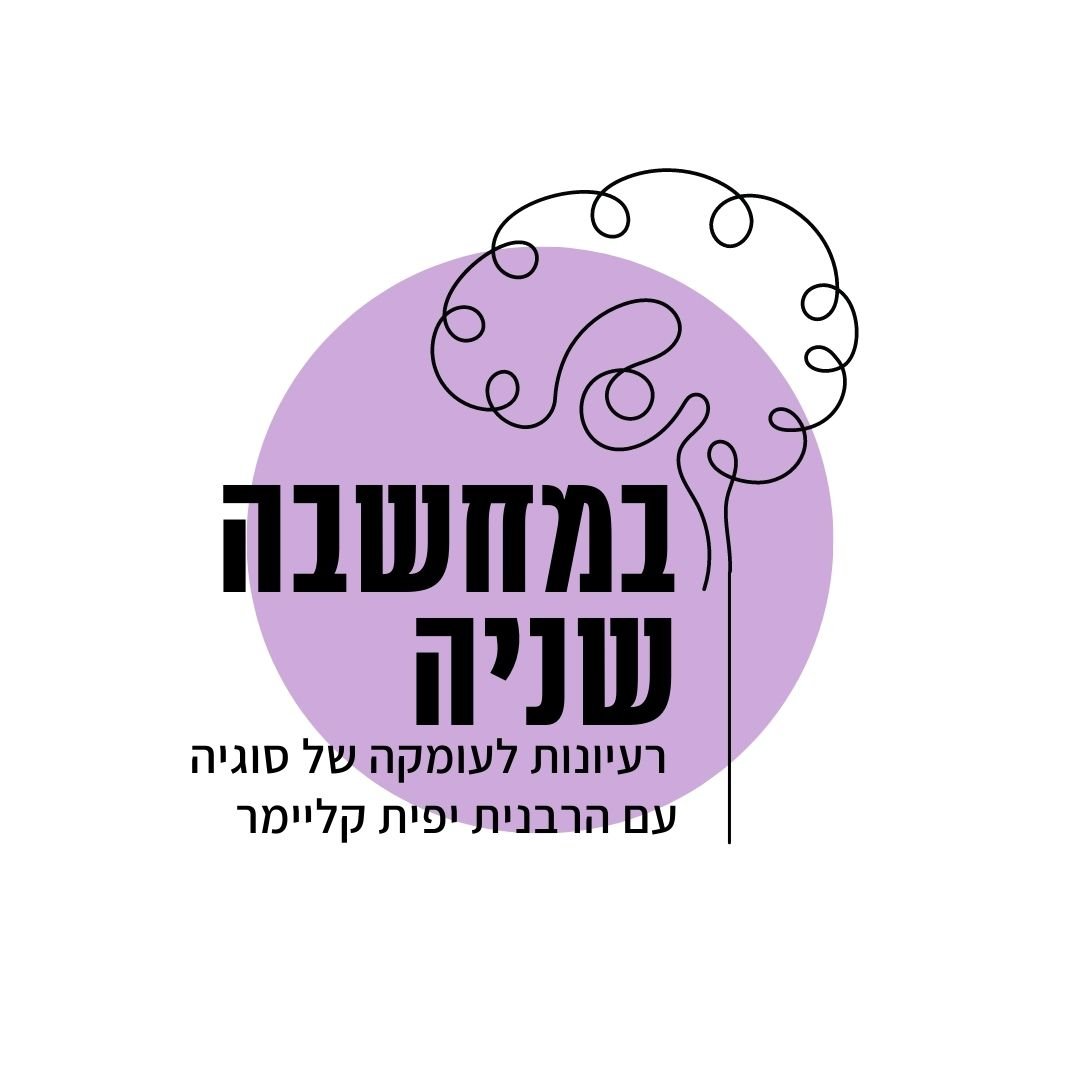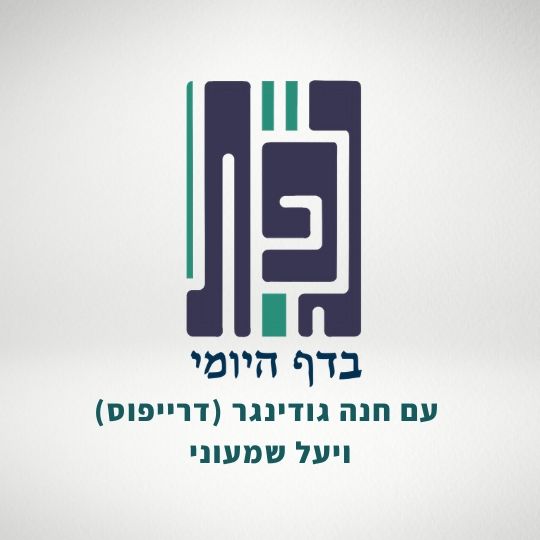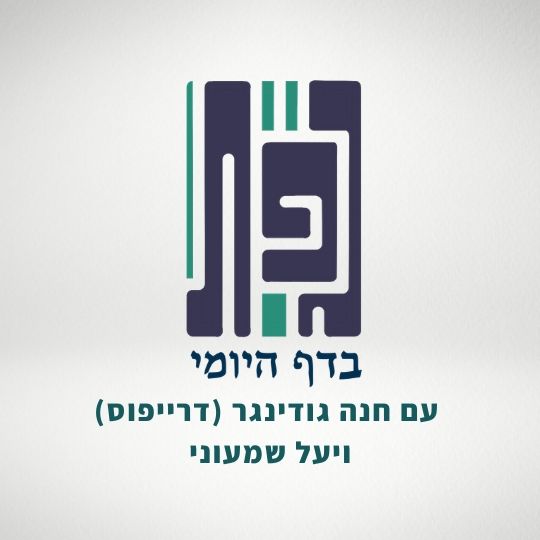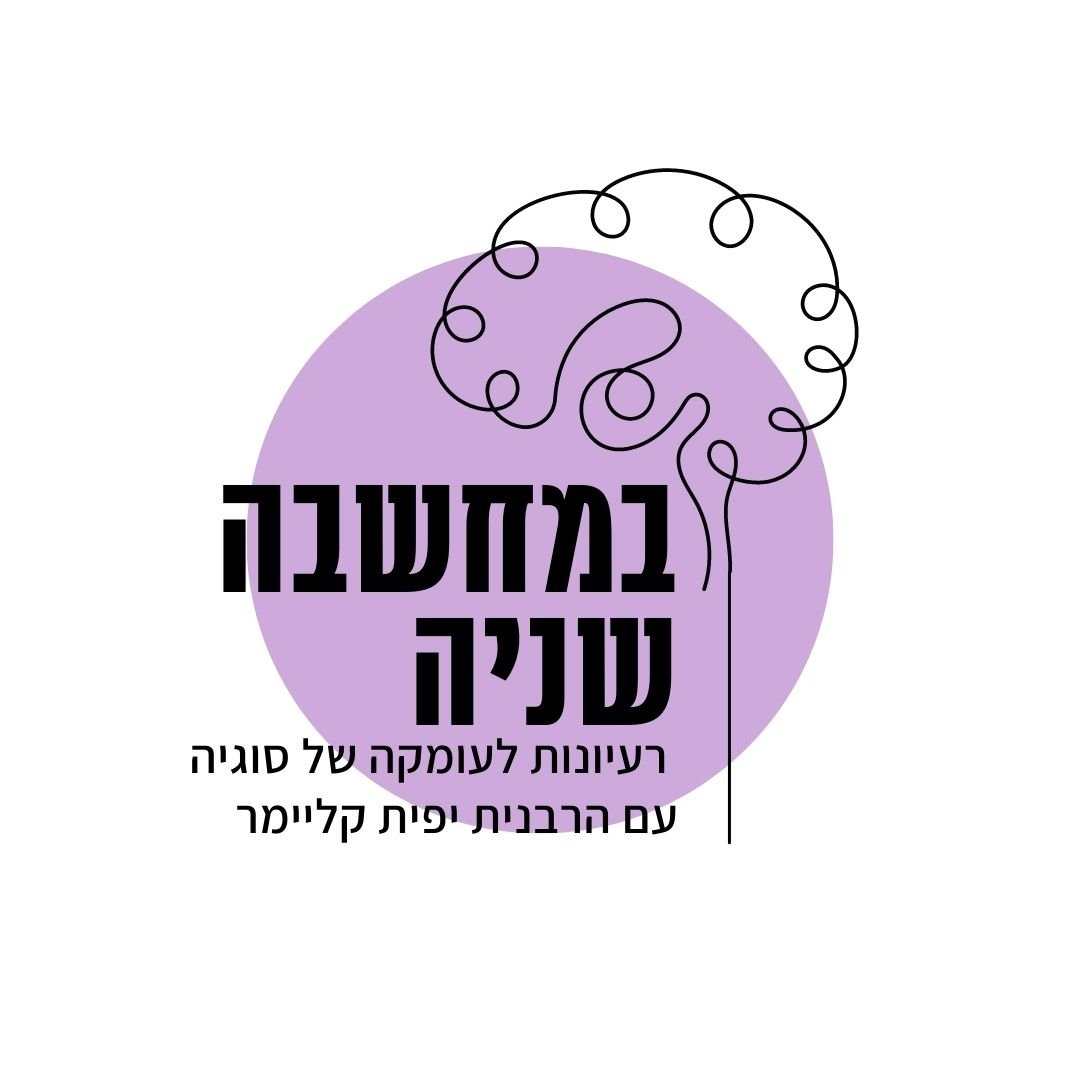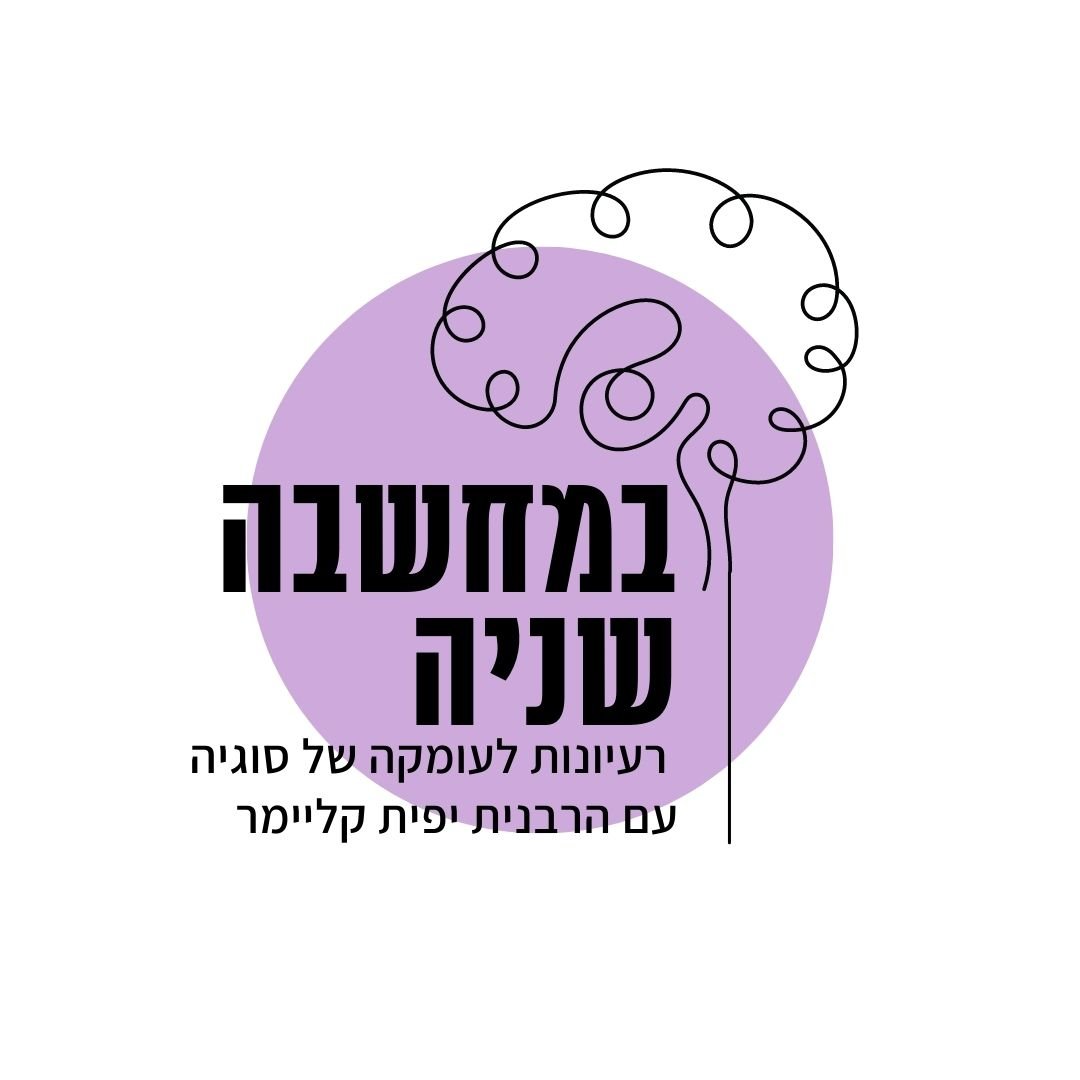הלימוד השבוע מוקדש לכבוד גייל ליכט על סיומה את הש”ס עם סיום מסכת גיטין!
הלימוד השבוע מוקדש לזכות ולשלום הַיְימׇנוֹט אֱמוּנָה בַּת באנצ’י (קָסָאוּ) בת 11 שנעלמה במקום מגוריה בצפת, לפני שנתיים, ביום ט”ז אדר תשפ”ד (25.2.24), ולא נודעו עקבותיה.
הלימוד השבוע מוקדש למען ביטחון המדינה, החיילים והאזרחים, ולמען חירותו של העם האיראני. שנזכה בקרוב שיתקיים בנו הפסוק: "לַיְּהוּדִים הָיְתָה אוֹרָה וְשִׂמְחָה וְשָׂשֹׂן וִיקָר”.
רוצה להקדיש שיעור?

כלים
הלימוד השבוע מוקדש לזכות ולשלום הַיְימׇנוֹט אֱמוּנָה בַּת באנצ’י (קָסָאוּ) בת 11 שנעלמה במקום מגוריה בצפת, לפני שנתיים, ביום ט”ז אדר תשפ”ד (25.2.24), ולא נודעו עקבותיה.
הלימוד השבוע מוקדש למען ביטחון המדינה, החיילים והאזרחים, ולמען חירותו של העם האיראני. שנזכה בקרוב שיתקיים בנו הפסוק: "לַיְּהוּדִים הָיְתָה אוֹרָה וְשִׂמְחָה וְשָׂשֹׂן וִיקָר”.
כלים
העמקה
רוצה להבין מה באמת קורה מתחת לפני השטח של הסוגיה?
שיעורים, פודקאסטים והרחבות של מיטב המורות שלנו יפתחו לך עוד זוויות וכיווני חשיבה.
חדשה בלימוד הגמרא?
זה הדף הראשון שלך? איזו התרגשות עצומה! יש לנו בדיוק את התכנים והכלים שיעזרו לך לעשות את הצעדים הראשונים ללמידה בקצב וברמה שלך, כך תוכלי להרגיש בנוח גם בתוך הסוגיות המורכבות ומאתגרות.
פסיפס הלומדות שלנו
גלי את קהילת הלומדות שלנו, מגוון נשים, רקעים וסיפורים. כולן חלק מתנועה ומסע מרגש ועוצמתי.
גיטין פט
הֲרֵי זוֹ מְגוֹרֶשֶׁת. מַאי טַעְמָא? קוֹל וְשׁוֹבְרוֹ עִמּוֹ.
she is considered to be divorced and may remarry. What is the reason for this? The rumor came with its receipt. The rumor that she is betrothed is canceled by the rumor that she is divorced.
אָמַר רָבָא: יָצָא לָהּ שֵׁם מְזַנָּה בָּעִיר – אֵין חוֹשְׁשִׁין לָהּ. מַאי טַעְמָא? פְּרִיצוּתָא בְּעָלְמָא הוּא דַּחֲזוֹ לַהּ.
§ Rava said: If a rumor circulated in the city that a woman engaged in licentious sexual intercourse, we are not concerned that the rumor is true with regard to her eligibility to marry a priest. What is the reason for this? It is assumed that people saw her engage in merely licentious behavior, in a manner that does not disqualify her from marrying a priest.
כְּתַנָּאֵי: אָכְלָה בַּשּׁוּק, גִּירְגְּרָה בַּשּׁוּק, הֵנִיקָה בַּשּׁוּק – בְּכוּלָּן רַבִּי מֵאִיר אוֹמֵר: תֵּצֵא. רַבִּי עֲקִיבָא אוֹמֵר: מִשֶּׁיִּשְּׂאוּ וְיִתְּנוּ בָּהּ מוֹזְרוֹת בַּלְּבָנָה.
This statement is parallel to one side of a dispute among the tanna’im: If a woman ate in the marketplace, walked with her neck stretched forward in an arrogant manner in the marketplace, or nursed in the marketplace, with regard to all of these cases Rabbi Meir says that she must leave her husband, since all of these behaviors are considered licentious behavior. Rabbi Akiva says that she must leave him only once the women who spin [mozerot] by the moonlight converse about her having engaged in promiscuous sexual intercourse, as this indicates that the matter is well known and accepted as fact.
אָמַר לוֹ רַבִּי יוֹחָנָן בֶּן נוּרִי: אִם כֵּן, לֹא הִנַּחְתָּ בַּת לְאַבְרָהָם אָבִינוּ שֶׁיּוֹשֶׁבֶת תַּחַת בַּעֲלָהּ, וְהַתּוֹרָה אָמְרָה: ״כִּי מָצָא בָהּ עֶרְוַת דָּבָר״, וּלְהַלָּן הוּא אוֹמֵר: ״עַל פִּי שְׁנַיִם עֵדִים אוֹ עַל פִּי שְׁלֹשָׁה עֵדִים יָקוּם דָּבָר״; מָה לְהַלָּן דָּבָר בָּרוּר, אַף כָּאן דָּבָר בָּרוּר.
Rabbi Yoḥanan ben Nuri said to him: If so, you have not allowed any daughter of Abraham our forefather to remain with her husband, i.e., all wives will be forced to leave their husbands, as it is common for women to slander their peers. And the Torah said: “Because he has found some unseemly matter in her, and he writes her a scroll of severance” (Deuteronomy 24:1), and it says over there: “At the mouth of two witnesses, or at the mouth of three witnesses, a matter shall be established” (Deuteronomy 19:15). Just as there, the word “matter” is referring to a clear matter, as it is established through witnesses, so too here, the unseemly matter that is considered a cause for divorce is also referring to a clear matter that was not established merely through a rumor. Rava’s statement is in accordance with this opinion.
תָּנוּ רַבָּנַן: ״בְּעוּלָה״ – אֵין חוֹשְׁשִׁין לָהּ. ״נְשׂוּאָה״ – אֵין חוֹשְׁשִׁין לָהּ. ״אֲרוּסָה״ – אֵין חוֹשְׁשִׁין לָהּ. ״שֶׁלֹּא לִפְלוֹנִי״ – אֵין חוֹשְׁשִׁין לָהּ. ״בְּעִיר אַחֶרֶת״ – אֵין חוֹשְׁשִׁין לָהּ.
The Sages taught: If a rumor circulated that a certain unmarried woman is a non-virgin, one is not concerned about it, and she may marry a High Priest. If a rumor circulated that she is a married woman, one is not concerned about it. If a rumor circulated that she is a betrothed woman, one is not concerned about it. If a rumor circulated that she is betrothed, but not to so-and-so, i.e., the man who betrothed her is not specified, one is not concerned about it. If a rumor circulated that she was betrothed in another city, one is not concerned about it.
״מַמְזֶרֶת״ – אֵין חוֹשְׁשִׁין לָהּ. ״שִׁפְחָה״ – אֵין חוֹשְׁשִׁין לָהּ.
If a rumor circulated that she is a daughter born from an incestuous or adulterous relationship [mamzeret], one is not concerned about it. If a rumor circulated that she is a maidservant, one is not concerned about it.
״הִקְדִּישׁ פְּלוֹנִי נְכָסָיו״; ״הִפְקִיר פְּלוֹנִי נְכָסָיו״ – אֵין חוֹשְׁשִׁין לָהֶן.
Similarly, if a rumor circulated that so-and-so consecrated his property, or that so-and-so renounced ownership of his property, we are not concerned about these rumors, and his property cannot be taken away by the Temple treasury or another person.
אָמַר עוּלָּא: לֹא שֶׁשָּׁמְעוּ קוֹל הֲבָרָה; אֶלָּא כְּדֵי שֶׁיְּהוּ נֵרוֹת דּוֹלְקוֹת וּמִטּוֹת מוּצָּעוֹת, וּבְנֵי אָדָם נִכְנָסִין וְיוֹצְאִין וְאוֹמְרִים: ״פְּלוֹנִית מִתְקַדֶּשֶׁת הַיּוֹם״.
§ Ulla says: The rumor mentioned in the mishna with regard to betrothal is not referring to a case where people only heard an echo. Rather, it is referring to a case where there is circumstantial evidence, as there are candles lit and beds made in the woman’s house, as was the custom for brides, and people entering and leaving and saying that so-and-so is becoming betrothed today.
״מִתְקַדֶּשֶׁת״?! וְדִלְמָא לָא אִקַּדַּשָׁה! אֵימָא: ״פְּלוֹנִית נִתְקַדְּשָׁה הַיּוֹם״.
The Gemara asks: If people merely are saying that she is becoming betrothed, what is the reason for concern? Perhaps she was not betrothed in the end. Rather, say that people are saying that so-and-so was betrothed today.
וְכֵן תָּנֵי לֵוִי: לֹא שֶׁיִּשְׁמְעוּ קוֹל הֲבָרָה; אֶלָּא כְּדֵי שֶׁיְּהוּ נֵרוֹת דּוֹלְקוֹת וּמִטּוֹת מוּצָּעוֹת, וְנָשִׁים טוֹוֹת לְאוֹר הַנֵּר וּשְׂמֵחוֹת לָהּ, וְאוֹמְרוֹת: ״פְּלוֹנִית מִתְקַדֶּשֶׁת הַיּוֹם״. ״מִתְקַדֶּשֶׁת״?! וְדִלְמָא לָא אִקַּדַּשָׁה! אָמַר רַב פָּפָּא, אֵימָא: ״פְּלוֹנִית נִתְקַדְּשָׁה הַיּוֹם״.
And similarly, Levi taught a baraita: The mishna is not referring to a case where people only hear an echo. Rather, it is referring to a case where candles are lit and beds are made, and women are spinning by candlelight and rejoicing for her and saying that so-and-so is becoming betrothed today. The Gemara asks: If they are merely saying that she is becoming betrothed, what is the reason for concern? Perhaps she was not betrothed in the end. Rav Pappa said: Say that they are saying that so-and-so was betrothed today.
אָמַר רַבָּה בַּר בַּר חָנָה אָמַר רַבִּי יוֹחָנָן: לֹא שֶׁשָּׁמְעוּ קוֹל הֲבָרָה; אֶלָּא כְּדֵי שֶׁיְּהוּ נֵרוֹת דּוֹלְקוֹת וּמִטּוֹת מוּצָּעוֹת, וּבְנֵי אָדָם נִכְנָסִין וְיוֹצְאִין. אָמְרוּ דָּבָר – זֶה הוּא קוֹל, לֹא אָמְרוּ דָּבָר – זֶהוּ אֲמַתְלָא.
Rabba bar bar Ḥana says that Rabbi Yoḥanan says: The mishna is not referring to a case where people only heard an echo. Rather, it is referring to a case where there are candles lit and beds made and people entering and leaving. If they made an explicit statement that the woman was betrothed, this is a rumor that renders her betrothed. If they did not make such a statement, this is the explanation mentioned in the mishna.
לֹא אָמְרוּ?! וְהָא לֹא אָמְרוּ וְלֹא כְּלוּם! לְאַפּוֹקֵי מִדְּרַבָּה בַּר רַב הוּנָא, דְּאָמַר: אֲמַתְלָא שֶׁאָמְרוּ, אֲפִילּוּ מִכָּאן וְעַד עֲשָׂרָה יָמִים. קָא מַשְׁמַע לַן – לָא אָמְרוּ, הוּא דְּהָוְיָא אֲמַתְלָא; הָא אָמְרוּ – לָא הָוְיָא אֲמַתְלָא.
The Gemara asks: If they did not make such a statement, why is it considered an explanation? But they did not say anything that requires an explanation. The Gemara answers that Rabbi Yoḥanan did not mean that the people did not say anything, but rather that they did not state unequivocally that the woman is betrothed, to the exclusion of that which Rabba bar Rav Huna said: The explanation mentioned in the mishna negates the rumor even if it circulates at some point from now until ten days after the rumor begins to circulate. Rabbi Yoḥanan therefore teaches us that only if the people did not say unequivocally that she is betrothed is it considered an explanation that negates the rumor. But if they said so unequivocally, any later explanation is not considered an explanation that negates the rumor.
אָמַר רַבִּי אַבָּא אָמַר רַב הוּנָא אָמַר רַב: לֹא שֶׁשָּׁמְעוּ קוֹל הֲבָרָה, אֶלָּא כְּדֵי שֶׁיֹּאמְרוּ: פְּלוֹנִי מֵהֵיכָן שָׁמַע? מִפְּלוֹנִי; וּפְלוֹנִי מִפְּלוֹנִי; וּבוֹדְקִין וְהוֹלְכִין עַד שֶׁמַּגִּיעִין לְדָבָר הַבָּרוּר.
Rabbi Abba said that Rav Huna said that Rav said: The mishna is not referring to a case where people only heard an echo. Rather, it is referring to a case where people say: From where did so-and-so hear that this woman is betrothed? From so-and-so, and so-and-so heard it from so-and-so. And as a result, the judges investigate the rumor continuously, tracing the hearsay until they reach a clear matter, i.e., eyewitnesses.
דָּבָר הַבָּרוּר – עֵדוּת מְעַלַּיְיתָא הוּא! אֶלָּא כִּי אֲתָא רַב שְׁמוּאֵל בַּר יְהוּדָה, אָמַר רַבִּי אַבָּא אָמַר רַב הוּנָא אָמַר רַב: לֹא שֶׁשָּׁמְעוּ קוֹל הֲבָרָה, אֶלָּא כְּדֵי שֶׁיֹּאמְרוּ: פְּלוֹנִי, מֵהֵיכָן שָׁמַע? מִפְּלוֹנִי; וּפְלוֹנִי מִפְּלוֹנִי; וְהָלְכוּ לָהֶם לִמְדִינַת הַיָּם.
The Gemara raises an objection: If the court reaches a clear matter it is proper testimony, not a rumor. Rather, when Rav Shmuel bar Yehuda came from Eretz Yisrael he taught that Rabbi Abba said that Rav Huna said that Rav said: The mishna is not referring to a case where people only heard an echo. Rather, it is referring to a case where people say: From where did so-and-so hear this? From so-and-so, and so-and-so heard it from so-and-so, and they went overseas, so that the court cannot investigate further.
אֲמַר לֵיהּ אַבָּיֵי לְרַב יוֹסֵף: מְבַטְּלִינַן קָלָא, אוֹ לָא מְבַטְּלִינַן? אֲמַר לֵיהּ: מִדְּאָמַר רַב חִסְדָּא: עַד שֶׁיִּשְׁמְעוּ מִפִּי הַכְּשֵׁרִים, שְׁמַע מִינַּהּ: מְבַטְּלִינַן קָלָא.
§ Abaye said to Rav Yosef: Do we suppress a rumor that was not substantiated by the court, or do we not suppress it? He said to him: Since Rav Ḥisda says that a rumor is not treated stringently until the court hears it from valid witnesses, which indicates that rumors are generally treated leniently, learn from it that we suppress a rumor.
אֲמַר לֵיהּ: אַדְּרַבָּה! מִדְּאָמַר רַב שֵׁשֶׁת: אֲפִילּוּ מִפִּי נָשִׁים הָוֵי קוֹל – שְׁמַע מִינַּהּ: לָא מְבַטְּלִינַן קָלָא!
Abaye said to him: On the contrary, since Rav Sheshet said that even if the court hears it from women it is considered a serious rumor, indicating that rumors are treated stringently, learn from it that we do not suppress a rumor.
אֲמַר לֵיהּ: אַתְרָווֹתָא נִינְהוּ; בְּסוּרָא מְבַטְּלִי קָלָא, בִּנְהַרְדְּעָא לָא מְבַטְּלִי קָלָא.
Rav Yosef said to him: These opinions correspond to the local custom in two different places. In Sura they suppress a rumor, whereas in Neharde’a they do not suppress a rumor.
הָהִיא דִּנְפַק עֲלַהּ קָלָא דְּאִיקַּדַּשָׁה לְבַר בֵּי רַב, אַתְיֵיהּ רַב חָמָא לַאֲבוּהּ, אֲמַר לֵיהּ: אֵימָא לִי – הֵיכִי הֲוָה עוֹבָדָא? אֲמַר לֵיהּ: עַל תְּנַאי קַדֵּישׁ, אַדַּעְתָּא דְּלָא אָזֵיל לְבֵי חוֹזַאי, וַאֲזַל. אֲמַר לֵיהּ: כֵּיוָן דִּבְעִידָּנָא דַּהֲוַאי קָלָא – לָא הֲוַאי אֲמַתְלָא, לָאו כֹּל כְּמִינָךְ דְּמַחְזְקַתְּ אֲמַתְלָא.
The Gemara relates several incidents: A rumor circulated that a certain woman was betrothed to a student of Torah. Rav Ḥama summoned her father and said to him: Tell me exactly how the incident transpired. The father said to him: The student betrothed her conditionally, with the intention that he would not go to the city of Bei Ḥozai, and he subsequently went there, thereby nullifying the betrothal. Rav Ḥama said to him: Since at the time that the rumor existed this explanation did not exist, it is not in your power to create the presumption of an explanation. Therefore, the rumor must be treated stringently.
הָהִיא דִּנְפַק עֲלַהּ קָלָא, דְּאִיקַּדַּשָׁה בַּאֲצִיפָּא דְּתוּחְלָא, בְּעֵינָא דְּ״בֵי שִׁיפֵי״. שַׁלְחַהּ רַב אִידִי בַּר אָבִין לְקַמֵּיהּ דְּאַבָּיֵי: כִּי הַאי גַּוְונָא מַאי? אֲמַר לֵיהּ: אֲפִילּוּ לְמַאן דְּאָמַר לָא מְבַטְּלִינַן קָלָא, בְּהָא מְבַטְּלִינַן קָלָא; מֵימָר אָמְרִי: עַיִּינוּ בְּהוּ רַבָּנַן בְּקִידּוּשֵׁי, וְלָא הֲוָה בְּהוּ שָׁוֶה פְּרוּטָה.
A rumor circulated that a certain woman was betrothed with a mat of dates [atzifa detoḥela] from the spring of Bei Shifei. Rav Idi bar Avin sent the case to be presented before Abaye, asking him: What is the halakha in a case like this? Should this rumor be suppressed? Abaye said to him: Even according to the one who said that we do not suppress a rumor, in this case we suppress the rumor. This is because if she marries someone else people will not slander her. Rather, they will say that the Sages investigated her betrothal, i.e., the value of the mat of dates with which she was betrothed, and concluded that it was not worth one peruta and therefore the betrothal was invalid.
הָהִיא דִּנְפַק עֲלַהּ קָלָא, דְּאִיקַּדַּשָׁה
A rumor circulated that a certain woman was betrothed
לְחַד מִבְּנֵי פְּלָנְיָא, אָמַר רָבָא: אֲפִילּוּ לְמַאן דְּאָמַר לָא מְבַטְּלִינַן קָלָא, בְּהָא מְבַטְּלִינַן קָלָא; מֵימָר אָמְרִי: עַיִּינוּ בְּהוּ רַבָּנַן בְּקִידּוּשֵׁי, וְקִידּוּשֵׁי קָטָן הֲווֹ.
to one of the sons of so-and-so, who had both adult and minor sons. The son to whom she was betrothed was not specified. Rava said: Even according to the one who says that we do not suppress a rumor, in this case we suppress the rumor. People will not slander her. Rather, they will say that the Sages investigated the betrothal and concluded that it was the betrothal of a minor.
הָהִיא דִּנְפַק עֲלַהּ קָלָא, דְּאִיקַּדַּשָׁה לְקָטָן הַנִּרְאֶה כְּגָדוֹל. אֲמַר לֵיהּ רַב מָרְדֳּכַי לְרַב אָשֵׁי: הֲוָה עוֹבָדָא, וְאָמְרוּ: עֲדַיִין לֹא הִגִּיעַ לִ״פְלַגּוֹת רְאוּבֵן״, שֶׁנֶּאֱמַר: ״לִפְלַגּוֹת רְאוּבֵן גְּדוֹלִים חִקְרֵי לֵב״.
A rumor circulated that a certain woman was betrothed to a minor boy who looked like an adult, as his body was developed like an adult. Rav Mordekhai said to Rav Ashi: There was a precedent in which the Sages said that there is no concern that people will think that the woman is betrothed, since the boy did not yet reach the divisions of Reuben, i.e., the competence of adulthood, as it is stated: “Among the divisions of Reuben there were major resolves of heart” (Judges 5:16). Therefore, the betrothal is rendered entirely invalid, and there is no concern of slander.
וּבִלְבַד שֶׁלֹּא תְּהֵא שָׁם אֲמַתְלָא: אָמַר רַבָּה בַּר רַב הוּנָא: אֲמַתְלָא שֶׁאָמְרוּ, אֲפִילּוּ מִכָּאן וְעַד עֲשָׂרָה יָמִים. רַב זְבִיד אָמַר: בִּמְקוֹם אֲמַתְלָא, חוֹשְׁשִׁין לַאֲמַתְלָא.
§ It is stated in the mishna that a rumor is treated seriously only provided there is no explanation. Rabba bar Rav Huna said: The explanation mentioned in the mishna negates the rumor even if it circulates at some point from now, i.e., from the time the rumor circulated, until ten days afterward. Rav Zevid says: Where there is the reasonable possibility of an explanation, we are concerned about the possibility of an explanation even if it is not mentioned explicitly, and the rumor is therefore disregarded.
אֵיתִיבֵיהּ רַב פָּפָּא לְרַב זְבִיד: וּבִלְבַד שֶׁלֹּא תְּהֵא שָׁם אֲמַתְלָא! אֲמַר לֵיהּ: בִּמְקוֹם אֲמַתְלָא קָאָמַר.
Rav Pappa raised an objection to the opinion of Rav Zevid from the expression in the mishna: Provided there is no explanation, which indicates that the explanation must be mentioned for it to be regarded. Rav Zevid said to him: The mishna is saying that where there is the reasonable possibility of an explanation the rumor is disregarded, even if it was not mentioned.
אֲמַר לֵיהּ רַב כָּהֲנָא לְרַב פָּפָּא: וְאַתְּ לָא תִּסְבְּרַאּ?! וְהָתְנַן: נִתְקַדְּשָׁה, וְאַחַר כָּךְ בָּא בַּעְלָהּ – מוּתֶּרֶת לַחְזוֹר. לָאו מִשּׁוּם דְּאָמְרִינַן עַל תְּנַאי קַדֵּישׁ?
Rav Kahana said to Rav Pappa: And you, do you not hold Rav Zevid’s statement to be true? But didn’t we learn in a mishna that if a woman was betrothed after her husband was taken for dead, and then her husband came back, she is permitted to return to him (Yevamot 92a), which would not have been the case if she had been married and not merely betrothed? Isn’t this because we say that the second man betrothed her conditionally, stipulating that if her husband is found to be alive the betrothal is null, even though this explanation did not circulate explicitly?
שָׁאנֵי הָתָם, דְּאָתֵי בַּעַל וְקָא מְעַרְעֵר.
The Gemara answers: It is different there because the husband comes and contests the betrothal, which shows clearly that he never divorced her and that her betrothal was mistaken. Therefore, there is no need for an additional explanation.
אִי הָכִי, נִישֵּׂאת נָמֵי! נִישֵּׂאת, דַּעֲבַדָה אִיסּוּרָא – קַנְסוּהָ רַבָּנַן; נִתְקַדְּשָׁה, דְּלָא עֲבַדָה אִיסּוּרָא – לָא קַנְסוּהָ רַבָּנַן.
The Gemara asks: If so, in a case where she married the second man, it should also be permitted for her to return to her first husband. Why do the Sages render it prohibited for her to do so? The Gemara answers: In a case where she married him, since she performed a prohibited action, albeit unintentionally, by engaging in sexual intercourse with a man who is not her husband while she was married, the Sages penalized her. By contrast, in a case where she was merely betrothed, since she did not perform a prohibited action, the Sages did not penalize her.
אָמַר רַב אָשֵׁי: כֹּל קָלָא דְּלָא אִיתַּחְזַק בְּבֵי דִינָא – לָאו קָלָא הוּא. וְאָמַר רַב אָשֵׁי: כֹּל קָלָא דְּבָתַר נִישּׂוּאִין – לָא חָיְישִׁינַן לֵיהּ; הָא דְּבָתַר אֵירוּסִין – חָיְישִׁינַן לֵיהּ. רַב חֲבִיבָא אָמַר: אֲפִילּוּ דְּבָתַר אֵירוּסִין נָמֵי, לָא חָיְישִׁינַן לֵיהּ. וְהִלְכְתָא: לָא חָיְישִׁינַן לֵיהּ.
§ Rav Ashi said: Any rumor that was not confirmed in court is not regarded as a significant rumor. And Rav Ashi said: With regard to any rumor that was spread about a woman after her marriage, we are not concerned about it. She need not leave her husband, and he need not divorce her. The Gemara infers that if the rumor circulated after her betrothal we are concerned about it, and she must be divorced from her betrothed. Rav Ḥaviva said: Even if it circulated after her betrothal, we are still not concerned about it. The Gemara concludes: And the halakha is that we are not concerned about it.
אָמַר רַב יִרְמְיָה בַּר אַבָּא: שְׁלַחוּ לֵיהּ מִבֵּי רַב לִשְׁמוּאֵל, יְלַמְּדֵנוּ רַבֵּינוּ: יָצָא עָלֶיהָ קוֹל מֵרִאשׁוֹן, וּבָא אַחֵר וְקִדְּשָׁהּ קִידּוּשֵׁי תוֹרָה, מַהוּ? שְׁלַח לְהוּ: תֵּצֵא, וְהַעֲמִידוּ הַדָּבָר עַל בּוּרְיוֹ, וְהוֹדִיעוּנִי.
Rav Yirmeya bar Abba said that a group of students from the study hall of Rav sent the following question to Shmuel after Rav’s death: Teach us, our master: If a rumor circulated about a woman that she is betrothed to a first man, and another man came and betrothed her in a manner of betrothal that is recognized by Torah law, as there is clear testimony of it, what is the halakha? He sent them an answer: She must leave the second man, and you clarify the matter to figure out exactly what happened and inform me.
מַאי ״וְהַעֲמִידוּ הַדָּבָר עַל בּוּרְיוֹ״? אִילֵּימָא דְּאִי מִגַּלְּיָא מִילְּתָא דְּקִידּוּשֵׁי דְקַמָּא לָאו קִידּוּשֵׁי מְעַלְּיָא נִינְהוּ – מְבַטְּלִינַן קָלָא; וְהָא נְהַרְדְּעָא אַתְרֵיהּ דִּשְׁמוּאֵל הוּא, וְלָא מְבַטְּלִי קָלָא! אֶלָּא דְּאִי מִיגַּלְּיָא מִילְּתָא דְּקִידּוּשֵׁי קַמָּא קִידּוּשֵׁי מְעַלְּיָא נִינְהוּ – לֹא צְרִיכָה גֵּט מִשֵּׁנִי.
The Gemara asks: What is meant by: And you clarify the matter? If we say that he said this so that if it is discovered that the betrothal of the first man was not a proper betrothal we should suppress the rumor, thereby permitting her to marry the second man, isn’t Neharde’a Shmuel’s locale? And as mentioned above, in Neharde’a they would not suppress a rumor. Rather, he must have instructed them in this manner because if it is discovered that the betrothal of the first man was a proper betrothal, she does not need a bill of divorce from the second man.
וּפְלִיגָא דְּרַב הוּנָא – דְּאָמַר רַב הוּנָא: אֵשֶׁת אִישׁ שֶׁפָּשְׁטָה יָדָהּ, וְקִיבְּלָה קִידּוּשִׁין מֵאַחֵר, מְקוּדֶּשֶׁת –
And in ruling that she does not need a bill of divorce from the second man, Shmuel is in disagreement with Rav Huna, as Rav Huna says: In the case of a married woman who extended her hand and received money or a document of betrothal from another man, it is considered uncertain whether or not the woman is betrothed to him, and she needs a bill of divorce from him.
מִדְּרַב הַמְנוּנָא; דְּאָמַר רַב הַמְנוּנָא: הָאִשָּׁה שֶׁאָמְרָה לְבַעְלָהּ: ״גֵּירַשְׁתַּנִי״ – נֶאֱמֶנֶת, חֲזָקָה אֵין אִשָּׁה מְעִיזָּה פָּנֶיהָ בִּפְנֵי בַּעְלָהּ.
Rav Huna’s opinion is based on a principle stated by Rav Hamnuna, as Rav Hamnuna says that a woman who said to her husband: You divorced me, is deemed credible, due to the presumption that a wife is not so brazen to lie in this manner before her husband. Therefore, in the case brought before Shmuel, the fact that the woman received money or a document of betrothal from the second man should be considered sufficient basis for the rumor to be suppressed, since if she were already betrothed she certainly would not have accepted the betrothal from him.
וְאִידַּךְ – כִּי אִתְּמַר דְּרַב הַמְנוּנָא, בְּפָנָיו; שֶׁלֹּא בְּפָנָיו – מְעִיזָּה וּמְעִיזָּה.
The Gemara asks: And how does the other Sage, Shmuel, who disagrees with Rav Huna, relate to this principle? The Gemara answers: He holds that Rav Hamnuna’s principle was stated in reference to a case when the wife says in her husband’s presence that he divorced her, but when she is not in his presence she is certainly brazen enough to lie in this manner. Therefore, in the case brought before Shmuel, the woman may have accepted the betrothal of the other man because it was not in her husband’s presence.
לֹא מָצְאוּ דָּבָר עַל בּוּרְיוֹ, מַהוּ?
The Gemara asks: What is the halakha if they did not find a clear matter, i.e., they could not establish with certainty whether she was betrothed to the first man?
אָמַר רַב הוּנָא: מְגָרֵשׁ רִאשׁוֹן, וְנוֹשֵׂא שֵׁנִי. אֲבָל מְגָרֵשׁ שֵׁנִי וְנוֹשֵׂא רִאשׁוֹן – לָא. מַאי טַעְמָא? אָתֵי לְמֵימַר: מַחְזִיר גְּרוּשָׁתוֹ מִן הָאֵירוּסִין.
Rav Huna says: The first man divorces her and the second man marries her. But for the second man to divorce her and the first man to marry her is not permitted. The Gemara explains: What is the reason that it is not permitted? It is prohibited lest people come to say that the first man is remarrying his divorcée after her betrothal to another man, as they will mistakenly assume that the first man betrothed her and then divorced her, thereby enabling her to be betrothed to the second man. Therefore, if he marries her after she is divorced from the second man, people will conclude that he is in violation of the Torah prohibition of remarrying one’s divorcée after she was married to another man.
רַב שִׁינָּנָא בְּרֵיהּ דְּרַב אִידִי אָמַר: אַף מְגָרֵשׁ שֵׁנִי וְנוֹשֵׂא רִאשׁוֹן, מֵימָר אָמְרִי: עַיִּינוּ רַבָּנַן בְּקִידּוּשֵׁי, וְקִידּוּשֵׁי טָעוּת הֲוָה.
Rav Shinnana, son of Rav Idi, says: For the second man to divorce her and the first man to marry her is also permitted. There is no concern that people will assume that the first man is remarrying his divorcée, as they will say that the Sages investigated the second man’s betrothal and found that it was a mistaken betrothal.
יָצָא עָלֶיהָ קוֹל מִזֶּה וּמִזֶּה, מַהוּ? אָמַר רַב פָּפָּא: אַף זוֹ – מְגָרֵשׁ רִאשׁוֹן וְנוֹשֵׂא שֵׁנִי. אַמֵּימָר אָמַר: מוּתֶּרֶת לִשְׁנֵיהֶם.
The Gemara asks: What is the halakha if a rumor circulated about her having been betrothed to this man and then another rumor was spread that she became betrothed to that man? Rav Pappa says: In this case too, the first man divorces her and the second man marries her, due to the previously mentioned concern that people will think that he is remarrying his divorcée after she was betrothed to another man. Ameimar says: She is permitted to both the first and the second man. One of them must divorce her while the other may marry her.
